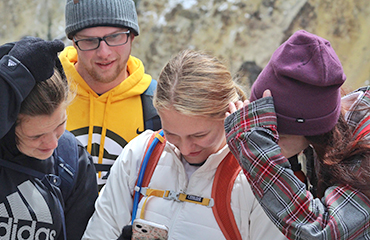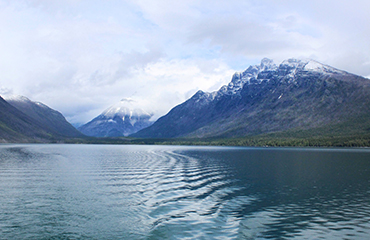 While study tours are enjoyable experiences for students studying at Lander University, they also present students with unique challenges they can’t get in the traditional classroom setting. Some require students to speak in other languages. Others require students to navigate public transportation in large metropolitan areas.
While study tours are enjoyable experiences for students studying at Lander University, they also present students with unique challenges they can’t get in the traditional classroom setting. Some require students to speak in other languages. Others require students to navigate public transportation in large metropolitan areas.
In preparation for Dr. Sean Barnette’s recent study tour, students learned about bears.
The trip was the second of its kind for the professor of English. This year’s study tour included stops in Glacier National Park and Yellowstone National Park—both known for their wildlife, including grizzly bears—as well as a visit to Salt Lake City. While the group never encountered a bear on their many hikes, they did see one from their rental car a safe distance away.
“Yellowstone and Glacier are home to grizzly bears,” said Elizabeth Sivertsen, a recent Lander graduate who majored in early childhood education. “We re-enacted what to do if you encounter a bear, and we talked about the different precautions you should take.”
One of those precautions, according to Sivertsen, was carrying and learning how to use bear spray. “There was never a time when someone in the group didn’t have bear spray,” she said.
Training for possible bear encounters was not the only challenge students faced on their study tour. While late May is often pleasantly warm in South Carolina’s Upstate region, there was still snow on the ground when they pulled into Yellowstone’s Madison campground, where students camped for three nights. Evening temperatures were often in the teens. Yet thanks to the proper preparation—thermal sleeping bags, and plenty of layers of clothing—the Lander students prevailed the harsh, unfamiliar climate.
“That was definitely a good experience,” Sivertsen said, who went on a similar trip with Barnette last year, but one that did not include camping. “I felt more connected with nature... that was a big part of the trip, being in nature.”
 As the study tour was titled “Rhetorical Recreation,” students also spent time reading, writing and discussing nature as a rhetorical concept, in addition to putting themselves in nature physically. Students were encouraged to learn about how humans interact with and talk about nature; and the trip itself was the finale to a semester-long study of the rhetoric of nature, where students reflected on what we really mean when we say “nature,” and where to properly draw the line between “nature” and “civilization.”
As the study tour was titled “Rhetorical Recreation,” students also spent time reading, writing and discussing nature as a rhetorical concept, in addition to putting themselves in nature physically. Students were encouraged to learn about how humans interact with and talk about nature; and the trip itself was the finale to a semester-long study of the rhetoric of nature, where students reflected on what we really mean when we say “nature,” and where to properly draw the line between “nature” and “civilization.”
When considering nature through this lens, National Parks themselves may seem quite odd. Their purpose is to connect the public with natural places, as well as to educate and to preserve. Yet, many students wrestled with whether being on an established trail meant truly crossing the invisible line between nature and civilization, or if it’s fair to say such a line exists at all.
For Andrew Goforth, a senior history and English double major at Lander, that line has to do with human presence. “It comes down to how many people are there naturally and how many people are there just to visit,” said Goforth. “While you go to national parks and you see that it’s clearly impacted by people because you have trails that take you to places that people have obviously been to before, the main difference is how many people are there all the time, and how many people actually live in that spot.”
But whether the trip includes visits to national parks, New York City, Washington, D.C. or another country, Sivertsen and Goforth both encourage Lander students to consider breaking away from Lander’s campus by completing a study tour or a study abroad experience. The challenges and real-world applications of classroom learning compliment the education students receive at Lander. And, in addition to improving a student’s educational experience, the collaboration and team-building that happens along the journey can also make students better employees for tomorrow’s workforce.
“The purpose of an education should be to prepare you to go outside of the place you were educated in,” said Goforth. “Going on this study tour prepared me for life after Lander because it showed me that there is a world outside of Lander.”
To learn more about Lander’s study tours and study abroad opportunities, please visit www.lander.edu/studyabroad.